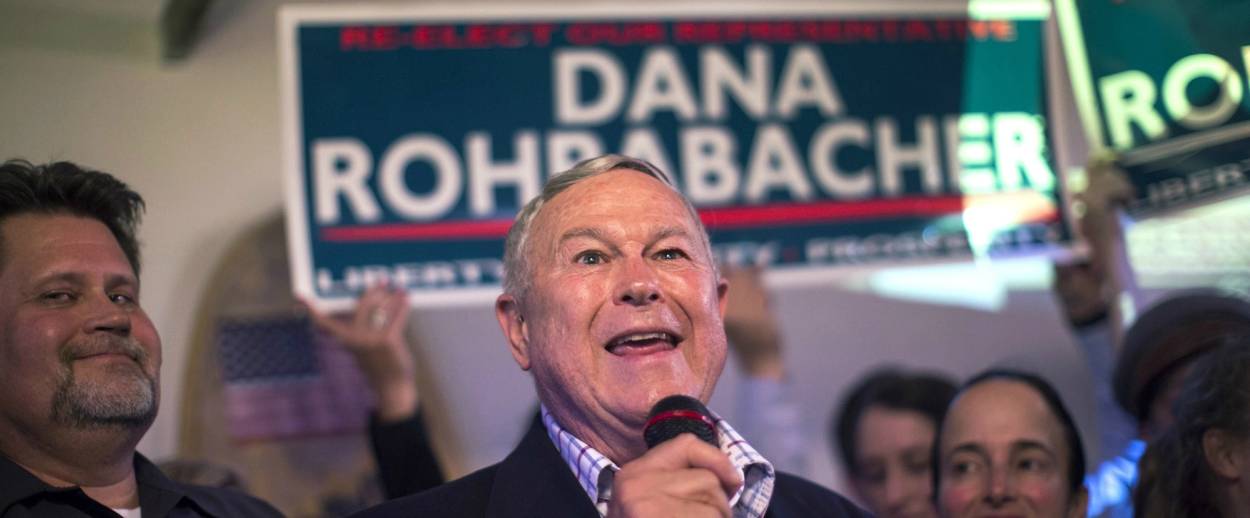Good Riddance to Dana Rohrabacher, ‘Putin’s Man in Congress’
It’s been a long strange trip for the anti-Communist cold warrior turned pro-Putin congressman




The political career of U.S. Rep. Dana Rohrabacher from California has traced an unusual path. Rohrabacher was at one time a Republican cold warrior and committed foe of the Soviet Union but after the collapse of what his boss Ronald Reagan called “the evil empire,” he morphed into a Russophile. In recent years, he was routinely referred to in the media as “Vladimir Putin’s favorite congressman.” Rohrabacher departed the Reagan administration in 1988 and spent the next 30 years in Congress, most recently representing California’s 48th district where, as a senior member of the House Foreign Affairs Committee, he championed closer relations to Putin’s Russia.
This morning, three colorful decades at the center of American politics for this oddest of odd birds, neared its end. As of press time, Rohrabacher is several thousand votes behind his Democratic opponent Harley Rouda, with all ballots in the district having been counted.
The folklore surrounding Rohrabacher’s pro-Russian activity is rife with the quirky and bizarre. There was the time that he took part in a delegation of Republican congressmen on a fact-finding mission to the Russian FSB building (the FSB replaced the KGB as Russia’s internal security service) led by the action movie star Steven Segal. (The portly Segal who has maintained a jet black ponytail into his late sixties even as the rest of him has gone to seed, is now a Russian citizen and has announced his candidacy for the governorship of a far Eastern province.) And who could forget the time Rohrabacher bragged about having arm wrestling competitions with President Putin? Of course, there were other escapades that were only whispered about Russia connoisseurs.
Ironically, Rohrabacher began his political life as a pro-Ukrainian firebrand. In his youth, Rohrabacher had a sideline as a Bob-Dylan-esque folk singer known to take out his guitar and serenade Ukrainian American journalists and official Soviet-Ukrainian delegations with his own ballads about the Ukrainian anarchist Nestor Makhno.
Among those who knew Rohrabacher in his younger years, like members of the Ukrainian-American diaspora active in Republican politics during the 1980s and colleagues in the Reagan administration, the Congressman’s transformation from ardent cold warrior to equally ardent pro-Kremlin apologist has been a subject of bemusement for many years.
Rohrabacher’s activities have become better known to the general public in recent years as special counsel Robert Mueller’s investigation into allegations of collusion between Russia and the Trump campaign cast its gaze on the Congressman’s activities. In particular, a meeting between Rohrabacher and President Trump’s national security adviser Mike Flynn (an equally avid supporter of close relations with Russia) had come under the microscope.
A year ago The New York Times reported that Rohrabacher was seen as a possible Russian asset worthy of being bequeathed an FBI code name. The Times also pointed out that:
“the F.B.I. and the Senate Intelligence Committee are each seeking to interview him about an August meeting with Julian Assange, the founder of WikiLeaks, Mr. Rohrabacher said. The special counsel, Robert S. Mueller III, is said to be interested in a meeting he had with Michael T. Flynn, Mr. Trump’s short-lived national security adviser.”
Upon learning the news, various Russia and Ukraine hands publicly mused whether Rohrabacher would follow in the footsteps of former European politicians like Gerhard Schröder and take up a seat on the board of directors of a Russian company. Or whether he would one-up Segal and enter Russian politics proper. Others wondered if he might travel to Chechnya for more friendly encounters with strongman Ramzan Kadyrov. Or perhaps would he simply take a job as a pundit on Russia Today, now RT?
What has been much less humorous, however, has been Rohrabacher’s committed opposition to the Magnitysky Act. The Congressman’s trajectory from cold warrior to Putin lackey was epitomized by his trips to Moscow to advocate against the 2012 Magnitsky Act before Kremlin officials.
The Maginitsky Act, for which the swashbuckling American banker and CEO of Hermitage Capital Bill Browder has tirelessly campaigned, acts to freeze the assets of Russian officials responsible for the death of Sergei Magnitsky. Magnitsky was Browder’s taxman and an investigator into a Russian tax scheme who was arrested by Kremlin authorities and blamed for the very scheme that he was investigating. According to evidence, he died of health problems caused by “being handcuffed to a bed and beaten by truncheon-wielding guards who left him to die in an isolation cell in Matrosskaya Tishina prison in Moscow.”
With its micro-targeting of officials close to President Putin, the Magnitsky Act has served as a tremendous irritant to Russian oligarchs and political officials.
Taking the opportunity to revel in what appears to be the end, at long last, of Rohrabacher’s Putinist advocacy inside of Congress, an ebullient Browder tweeted: “Putin loses proxy war in Orange County as his minion Dana Rohrabacher is defeated by Harley Rouda. Rohrabacher was the main person in Congress who determinedly tried to get the Magnitsky Act repealed. A good day for truth and justice. Good riddance”.
Rohrabacher losing his reelection bid is indeed good news and good riddance for anyone who opposes the authoritarianism and brutality of the Putin regime.
Vladislav Davidzon is Tablet’s European culture correspondent and a Ukrainian-American writer, translator, and critic. He is the Chief Editor of The Odessa Review and a Non-Resident Fellow at the Atlantic Council. He was born in Tashkent, Uzbekistan, and lives in Paris.